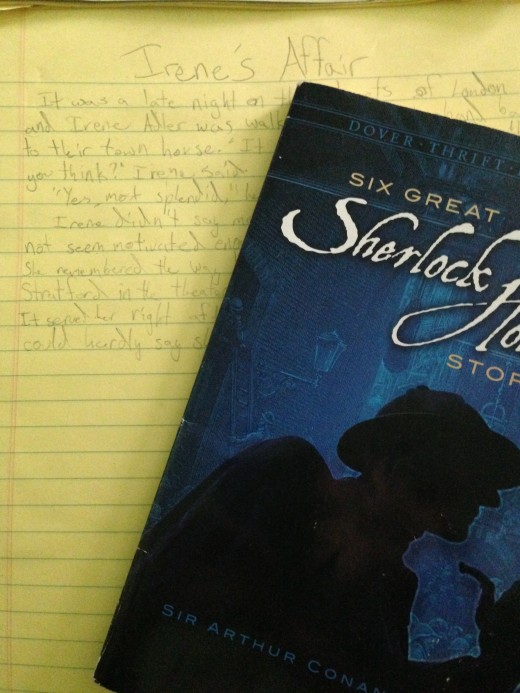Write Your Own Story: The Fanfiction Controversy

A big debate in the writing world is over fanfiction, or using the characters and settings of someone else’s work in his or her own stories. There are many debates over not only the legality of fanfiction, but also the morality of it. Diana Gabaldon, author of the Outlander series, makes her position on fanfiction clear. “I think it’s immoral, I know it’s illegal, and it makes me want to barf whenever I’ve inadvertently encountered some of it involving my characters.” Is what she wrote in a blog post back in 2010. She later changed the post to be more tactful, but her sentiment was still the same. Bestselling author Meg Cabot, however, has a different opinion. She wrote on her website: “I myself used to write Star Wars fan fiction when I was tween. I think writing fan fiction is a good way for new writers to learn to tell a story.”
Do you like fanfiction?
Meg Cabot wasn’t the only author who started out writing fanfiction. Cassandra Clare (Mortal Instruments), R.J. Anderson (Faery Rebels series), Neil Gaiman (Coraline), and S.E. Hinton (The Outsiders) all wrote fanfiction.
Many authors think fanfiction has a lot of benefits. With pre made characters and setting, it allows beginning writers to learn how to tell a story with more focus on plot than characters, although made fanfiction writers make up their own characters as well. Fanfiction is also a good way to beat writer’s block, or to develop one of your characters more. If you have a protagonist you need to develop, having her interact with some of your favorite literary characters is a great way to know her personality more, and it can also give you some inspiration for the plot of your own story. Some writers also think it’s a great way to tackle their inner perfectionists. “When I’m writing one of my own stories,” One writer says, “ I get caught up in little details, like facts and character development, even if it’s just a first draft. It took forever to finish a first draft of one of my stories, if I ever did. However, with fanfiction, I never worried about it, because I was publishing anonymously, and it was just for fun. As long as the story was relatively consistent and had no typos, I was satisfied with it. Now I pretend my own stories are like fanfiction pieces when I’m writing my first draft. It lets me make a few mistakes now and then.”
Not only are there benefits for fanfiction writers, but there are also benefits for the original authors, according to Cathynne M. Valente. “Quashing fanfiction is not only self sabotaging but wrong... So much ire spent over something that ultimately helps books, keeps the conversation going past the long tail of marketing, keeps them alive and loved—I've never understood it.” As a midlist author, Cathrynne doesn’t consistently see fanfiction with her characters, but she’s always pleased when she does because she likes knowing someone liked her books enough to make stories about it themselves. It also acts as free publicity. However, she can’t read fanfictions of her own pieces because of legal issues.
Legal issues are one of many reasons writers get annoyed over fanfiction. “It’s an attack on the means of my livelihood,” says Orson Scott Card. Even though fanfiction authors don’t make money off of their stories, there are legal issues involved. Fanfiction writer Cleolinda Jones understands this. In January 2014 she recounted an incident she had with the producers of the X-Files through a series of tweets: “A side note on writers who can’t read fanfic to protect themselves: young college student Cleo wrote an X-Files script. Of course I sent it to them because I was That Fan. I was clearly not unique because they knew a script package when they saw one and sent it back unopened with a kind of stock letter from legal about liabilities. So I knew they hadn’t read it. Here’s the thing: years later there was an episode that was partly but weirdly similar to my script. It they hadn’t sent it back *unopened*, I could have genuinely believed they ripped me off. IN COURT. Even though they truly had not read it.” If there wasn’t proof, however, that they hadn’t read the script, then X-Files would have be vulnerable to a lawsuit. The same applies to any author. Although this is a big reason for why authors don’t like fanfiction, it’s not the only reason. Many call it lazy, offensive, and an invasion. “Go write your own story,” Stephanie Meyers said.
Personally, I don’t think there’s anything wrong with fanfiction. I can understand not wanting to read fanfiction of your own work. After all, nobody wants to be vulnerable to lawsuits. I also have to admit that there are some fanfiction stories that aren’t good, but there’s also a lot of original works that have about the same quality. Fanfiction, in my opinion, is like anything: it’s as good and as valuable as you make it.








